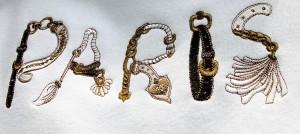Writers@Work: The Art and Science of Translation by Katherine Douglass
When I first spoke with Katherine several years ago, she was living in France. Though she described her house as old and drafty, I envied her romantic life—living and working in the French countryside. She was working on a book, translating a journal and other French-language documents as part of her research. I was amazed. Today, Katherine has woven together her talent and experience in writing and French to design an amazing career in translating. Read her post to learn how you can do it, too. And if you’re not gifted with a second language, read it anyway: she has some great social media tips for you. All the best, Rochelle, the Write Now! Coach
 The Art and Science of Translation by Katherine Douglass
The Art and Science of Translation by Katherine Douglass
Do you love Les Misérables? Anna Karenina? Love in the Time of Cholera? Unless you’re reading them in their original French, Russian or Spanish, thank a translator. Translators are the unsung, silent heroes who make great literature accessible around the world. We also make websites, newspapers, marketing materials, patent applications and birth certificates understandable to a wide audience!
I’m a freelance translator who works exclusively from French into English. I specialize in the arts, culture and history, and my clients include one of Europe’s pre-eminent French language newspapers and a 200+ year old French museum.
What does translation have to do with writing? Can’t you just copy some text into Google Translate, push a button and BOOM there’s Anna Karenina in English? Of course not. Being an excellent translator means being an excellent writer and editor, too. A text that causes the reader to stop and say “what?” isn’t a good translation. A truly good translation is one that is so smoothly written that the reader never has to go back and read a sentence again because it doesn’t sound “right.” As Edith Grossman, who translated the works of Gabriel García Márquez and Mario Vargas Llosa, said, “Fidelity is surely our highest aim, but a translation is not made with tracing paper… A translation can be faithful to tone and intention, to meaning. It can rarely be faithful to words or syntax, for these are peculiar to specific languages and are not transferable.” Just like writers, translators have to keep up their skills by reading extensively in their source (original) and target (translated into) languages, journaling and listening. Language is the translator’s medium just as it is the writer’s.
How does someone get to be a translator? Again, it’s like being a writer. Beyond having excellent skills in both source and target languages (don’t even think about it if you don’t), you have to love it and do it constantly. My first major translation project, a 180-page book, was done for myself for pure pleasure. Nobody asked me or paid me to do it: I wanted to do it. After I completed it, I realized how easy it was for me and how much fun I had. I continued to translate news articles, documents and forms for people who knew that I had the skills. Finally, I realized I should turn translation into my own business: it was and is my bliss.
I incorporated as an LLC and made sure I was active on social media. In fact, I have Rochelle to thank for that: she pushed me to get on LinkedIn and Twitter, and the two have been essential for my business. Through LinkedIn, I am able to connect with other translators and clients who might need my services. I not only belong to translator/writer/editor groups, but travel, tourism, history and cultural groups where I might encounter potential clients.
My LinkedIn profile is constructed to bring clients and job leads to me. I make sure I include plenty of key words in my headline and summary section. I post projects and links to my translations. As a result, I’ve been able to connect with some great jobs. If you think LinkedIn isn’t for freelancers, you’re missing a lot of the action. LinkedIn regularly has freelance jobs posted, including in writing, editing and translating. I found my largest client through a posting on LinkedIn. Recently, my college alma mater advertised for a freelance writer/editor to work 20 hours per week, long term. The job lead came directly to my profile. Of course I applied!
Twitter is another essential tool. I follow some of the “big names” in French/English translation but I also follow French, Belgian, Swiss and Canadian news outlets, travel services, historic preservation organizations and wine producers. One of my favorite things is to quote their tweets and include a short English translation. This piques the interest of my English-speaking followers and shows my French-speaking sources that I can help them win a wider audience.
I love to write. I love to translate. The more I can let people know that, the longer I’ll be writing and translating.
Write on!
 About the author. Katherine Douglass is a freelance translator, writer and editor with KED Language Services LLC. She has degrees in English, anthropology and divinity, and has lived, worked and studied in Belgium and France. Currently residing in the Washington, D.C. area, Katherine’s clients are located all over the world and give her a great reason to travel.
About the author. Katherine Douglass is a freelance translator, writer and editor with KED Language Services LLC. She has degrees in English, anthropology and divinity, and has lived, worked and studied in Belgium and France. Currently residing in the Washington, D.C. area, Katherine’s clients are located all over the world and give her a great reason to travel.
Her love affair with France began early in life with French lessons at the age of 8. Books, especially Mary Stewart’s early novels, took her on virtual adventures in France that continue to inspire her.
Katherine provides personalized translation services in the fields of arts, culture and history. She enjoys working directly with her clients and understanding their goals. For more information on Katherine’s services, contact her at douglass.katherine@kedlanguagesvcs.com and follow her on Twitter at @katherinedougl2 .








